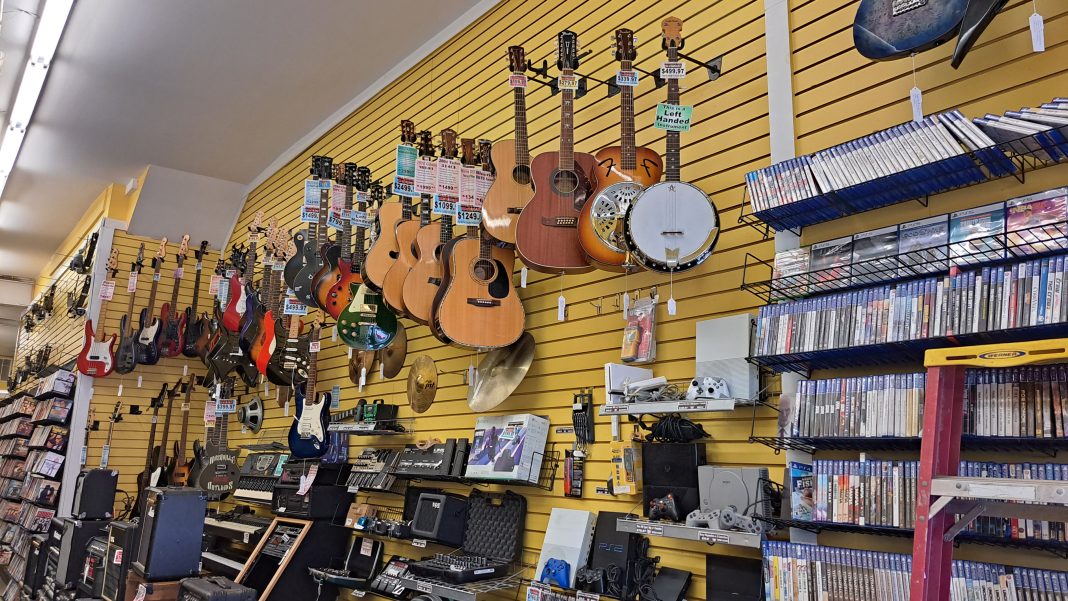Tom Greenberg stands behind a wooden counter, watching over a series of used musical instruments, video games, DVDs, electronics, jewelry, and mechanical tools—a second-hand collection he has curated for almost 20 years.
Located at 22 East Washington Street in downtown Greencastle, the Pawn Store houses a vast catalog of second-hand items that evoke a sense of nostalgia, fascination, and curiosity among local customers and visitors.
“Back before the internet, there was a thing called the Trader Paper and it was a Midwestern classified ad paper [where] people would put ads for anything…housewares, guitars [amplifiers], stuff like that,” Greenberg says. He explains that people didn't really know what they had and he would buy the items to sell and resell them.”
Greenberg's affinity for memorizing prices and his expertise in guitars, pedals, and musical amplifiers inspired him to start his first pawn store in Crawfordsville, Indiana, one of the closest markets to his house. He also worked for another pawn store in Terre Haute, before hearing about the opportunity to start a new business in downtown Greencastle.
“When I was looking around for markets to start a pawn shop in, Greencastle had a small pawn shop. But it was also the weakest pawn shop…once it went out of business, it was a no-brainer,” says Greenberg.
On March 18, 2004, Greenberg established the Pawn Store in downtown Greencastle. He points at the wooden shelves behind his store counter, where his old pricing catalogs once sat.
“Before you could look anything up [on the internet] and find anything out about something…everything you see back here would be filled with hundreds, if not a few thousands of catalogs,” he says, highlighting the pricing process before the existence of Amazon, eBay, and other online retailers.
Since then, his second-hand collection has immensely grown. Breathtaking gemstones shine atop a row of silver jewelry in the store’s central glass displays. On the left, metal shelves hold cub cadets, weed eaters, chainsaws, and space heaters. On the opposite wall, a line of banjos, acoustic guitars, cymbals, and keyboards hang on dark hooks. Across the store counter, rows of DVDs showcase popular 2000s movies, from “High School Musical” and “50 First Dates” to “Ocean’s Twelve.”
“Old video games are [also] starting to get really popular,” Greenberg says, naming the original Nintendo Entertainment Systems, Nintendo 64s, and original Playstations.
As he walks toward the glass display of his game consoles and video game cards, a woman in a black coat and brown flip-flops enters the store.
“Can I do anything for you?” Greenberg asks. “Oh right, the PS4.”
He grabs a tall cardboard box sitting atop the glass display, retrieving the console equipment as the woman quietly observes the jewelry section. He places the PS4 console inside multiple layers of plastic bags, instructing the woman to support the bottom of the console to prevent damage.
“When someone brings something in like this PS4 [console]...we test [its performance]. And then when we sell it, we test it again,” Greenberg says, highlighting his meticulous evaluation process to avoid misleading claims of damaged products.
Minutes later, a man in a black shirt and a dark cap walks in. He scans through the store’s guitar collection hanging on the yellow walls, with laminated labels showcasing prices between $99 to $2,500.
“I’m working on an album, and I'm on vacation right now and I literally just need to have a bass guitar,” the customer says. “But I don't wanna just be like, doing a $2 bass guitar.”
Greenberg nods. “I tell you what, this is the best deal I'm gonna make on a bass guitar.”
The two head to the counter, as Greenberg plugs the guitar into an amplifier. As he plucks the lowest string, a rich bass tone echoes through the store walls. The customer nods in approval, deciding to purchase the bass guitar at around $1,000.
Greenberg walks back to his wooden counter. “Did you hear what that guy just said?... He said ‘[four years ago,] I sold you that guitar that's up there, maybe I'll buy it back.’”
He further emphasizes the mischaracterization of the types of customers who use the pawn shop’s services.
“So a lot of these [customers] don't even have checking accounts because they're on the edge,” Greenberg explains. “They literally go from place to place… the electric company, the gas company, and the water company, and then they pay their bills in cash because they don't have checking accounts.”
He describes the customers’ exchanges at the Pawn Store as their own little “Christmas,” where they can directly sell their items and obtain loans on these products. If customers fail to pay off their loans, the items are simply kept in the pawn store and sold at curated prices instead of being reported to credit agencies.
“There’s a lot of people that really depend on being able to come in when they just need $100 or $50,” Greenberg says. “So we provide a very necessary service for a pretty large segment of the [Greencastle] population.”
As new customers across the Greencastle community discover the diverse items within Greenberg’s collection, the downtown Pawn Store continues to unravel new experiences and memories encapsulated in each second-hand product, one exchange at a time.

